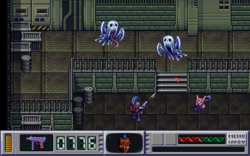Emil explains the dialogue comments
Emil explains the dialogue comments
Game News - posted by Vault Dweller on Tue 28 August 2007, 03:08:40
Tags: Bethesda Softworks; Fallout 3Remember the "we didn't want to penalize or reward the player for carrying on a conversation" comments Emil made the other day? Well, turned out a lot of people weren't overly impressed with them, so Emil got in his bike and <a href=http://www.bethsoft.com/bgsforums/index.php?showtopic=748460&st=60&p=10837831&#entry10837831>started backpedaling[/url] faster than Pete Hines trying to weasel his way out of "We're not going to suddenly do a top-down isometric Baldur's Gate-style game..." line.
Wow, I didn't realize the comments I made in that 1Up interview -- you know, about dialogue -- would cause such a stir! Mostly because I didn't realize I had chosen my words so poorly. Ugh.I guess that's why you didn't want to penalize players for failing dialogue checks, eh?
Believe me or not, but here's the reality of dialogue in Fallout 3: it does matter. It matters more than dialogue in one of our games has ever mattered. I feel really comfortable saying that, because one of my responsibilities is editing and directing all the dialogue that gets written, and one of my personal crusades is pushing the NPC interactions to be more meaningful. We approached that level in Oblivion -- now I really feel like we've truly reached it.Great start (I really liked that powerful "it does matter!" part), but the ending killed it. Anyway, here is the rest:
So yes, you do get to roleplay through dialogue: sometimes, how you say something is just as important (and enjoyable) as what you say. Yes, you can ask different NPCs different things, in different ways. Yes, a lot of times your skills and attributes (besides just Speech) will open up new dialogue options. And yes, what you say in dialogue will matter. Act like a wiseguy, and an NPC may attack you, or refuse to deal with you. Treat an NPC with respect, and maybe he'll be more willing to talk to you.
Of course, in the true spirit of Fallout -- in which the NPCs themselves have personalities -- it really depends on who you're dealing with. NPCs, like people, have their own quirks and preferences. Take a bold approach with the right NPC, and she may like you even more. Play the weakling with the wrong guy, and you may just tick him off. So, indirectly, dialogue affects the ending of the game in the sense that it can open or close quest paths, which in turn can lead the player to perform good or bad actions, which in turn determines the player's karma rating... which does factor into the endgame. I hope that clears things up a bit.
Overall, our goal with dialogue is to craft unique, meaningful interactions with the NPCs. We want the player to feel like he or she is having a conversation with a person -- not clicking on an information kiosk. Our designers have fully embraced that philosophy, and the game's dialogue reflects that. I really do think you'll be happily surprised when you play the game.Discuss.
Spotted at NMA
Wow, I didn't realize the comments I made in that 1Up interview -- you know, about dialogue -- would cause such a stir! Mostly because I didn't realize I had chosen my words so poorly. Ugh.
Believe me or not, but here's the reality of dialogue in Fallout 3: it does matter. It matters more than dialogue in one of our games has ever mattered. I feel really comfortable saying that, because one of my responsibilities is editing and directing all the dialogue that gets written, and one of my personal crusades is pushing the NPC interactions to be more meaningful. We approached that level in Oblivion -- now I really feel like we've truly reached it.
So yes, you do get to roleplay through dialogue: sometimes, how you say something is just as important (and enjoyable) as what you say. Yes, you can ask different NPCs different things, in different ways. Yes, a lot of times your skills and attributes (besides just Speech) will open up new dialogue options. And yes, what you say in dialogue will matter. Act like a wiseguy, and an NPC may attack you, or refuse to deal with you. Treat an NPC with respect, and maybe he'll be more willing to talk to you.
Of course, in the true spirit of Fallout -- in which the NPCs themselves have personalities -- it really depends on who you're dealing with. NPCs, like people, have their own quirks and preferences. Take a bold approach with the right NPC, and she may like you even more. Play the weakling with the wrong guy, and you may just tick him off. So, indirectly, dialogue affects the ending of the game in the sense that it can open or close quest paths, which in turn can lead the player to perform good or bad actions, which in turn determines the player's karma rating... which does factor into the endgame. I hope that clears things up a bit.
Overall, our goal with dialogue is to craft unique, meaningful interactions with the NPCs. We want the player to feel like he or she is having a conversation with a person -- not clicking on an information kiosk. Our designers have fully embraced that philosophy, and the game's dialogue reflects that. I really do think you'll be happily surprised when you play the game.
Spotted at NMA
There are 56 comments on Emil explains the dialogue comments














